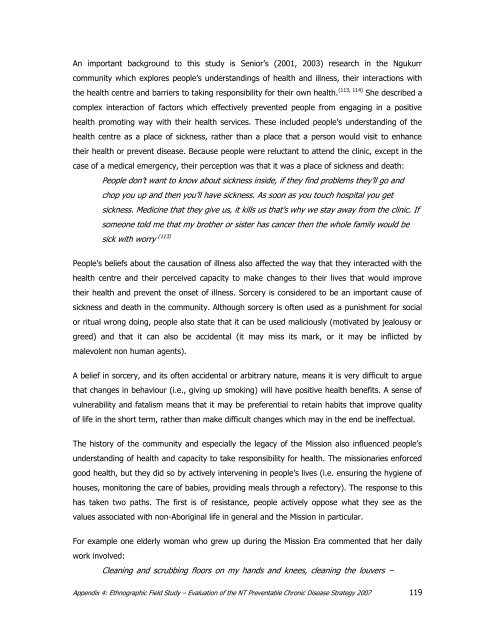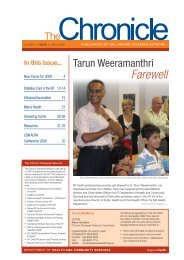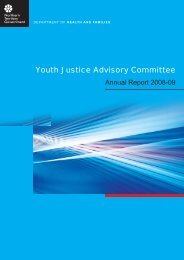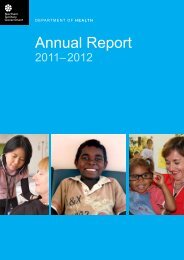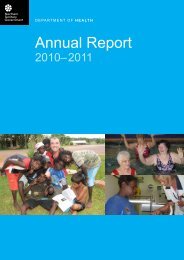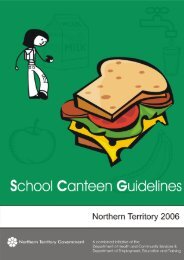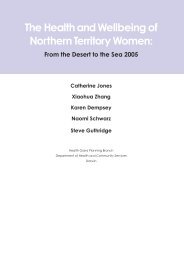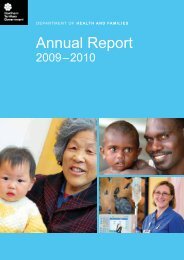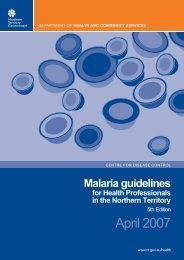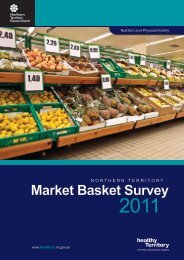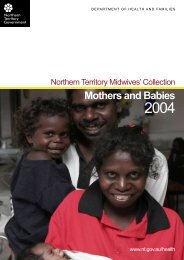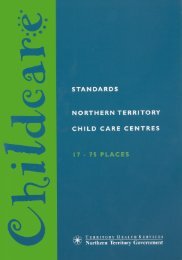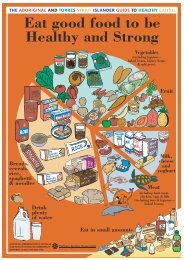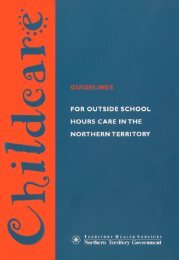PCD Strategy Evaluation 2007.pdf - NT Health Digital Library ...
PCD Strategy Evaluation 2007.pdf - NT Health Digital Library ...
PCD Strategy Evaluation 2007.pdf - NT Health Digital Library ...
You also want an ePaper? Increase the reach of your titles
YUMPU automatically turns print PDFs into web optimized ePapers that Google loves.
An important background to this study is Senior‟s (2001, 2003) research in the Ngukurrcommunity which explores people‟s understandings of health and illness, their interactions withthe health centre and barriers to taking responsibility for their own health. (113, 114) She described acomplex interaction of factors which effectively prevented people from engaging in a positivehealth promoting way with their health services. These included people‟s understanding of thehealth centre as a place of sickness, rather than a place that a person would visit to enhancetheir health or prevent disease. Because people were reluctant to attend the clinic, except in thecase of a medical emergency, their perception was that it was a place of sickness and death:People don‟t want to know about sickness inside, if they find problems they‟ll go andchop you up and then you‟ll have sickness. As soon as you touch hospital you getsickness. Medicine that they give us, it kills us that‟s why we stay away from the clinic. Ifsomeone told me that my brother or sister has cancer then the whole family would besick with worry (113)People‟s beliefs about the causation of illness also affected the way that they interacted with thehealth centre and their perceived capacity to make changes to their lives that would improvetheir health and prevent the onset of illness. Sorcery is considered to be an important cause ofsickness and death in the community. Although sorcery is often used as a punishment for socialor ritual wrong doing, people also state that it can be used maliciously (motivated by jealousy orgreed) and that it can also be accidental (it may miss its mark, or it may be inflicted bymalevolent non human agents).A belief in sorcery, and its often accidental or arbitrary nature, means it is very difficult to arguethat changes in behaviour (i.e., giving up smoking) will have positive health benefits. A sense ofvulnerability and fatalism means that it may be preferential to retain habits that improve qualityof life in the short term, rather than make difficult changes which may in the end be ineffectual.The history of the community and especially the legacy of the Mission also influenced people‟sunderstanding of health and capacity to take responsibility for health. The missionaries enforcedgood health, but they did so by actively intervening in people‟s lives (i.e. ensuring the hygiene ofhouses, monitoring the care of babies, providing meals through a refectory). The response to thishas taken two paths. The first is of resistance, people actively oppose what they see as thevalues associated with non-Aboriginal life in general and the Mission in particular.For example one elderly woman who grew up during the Mission Era commented that her dailywork involved:Cleaning and scrubbing floors on my hands and knees, cleaning the louvers –Appendix 4: Ethnographic Field Study – <strong>Evaluation</strong> of the <strong>NT</strong> Preventable Chronic Disease <strong>Strategy</strong> 2007 119


